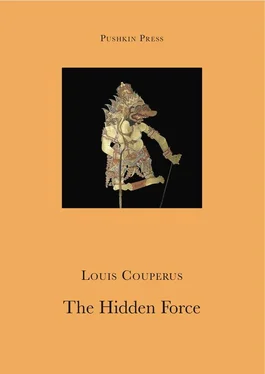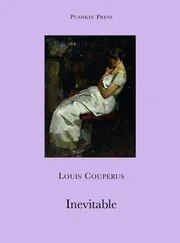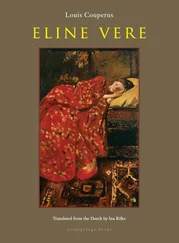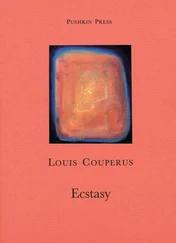Louis Couperus - The Hidden Force
Здесь есть возможность читать онлайн «Louis Couperus - The Hidden Force» весь текст электронной книги совершенно бесплатно (целиком полную версию без сокращений). В некоторых случаях можно слушать аудио, скачать через торрент в формате fb2 и присутствует краткое содержание. Год выпуска: 2012, ISBN: 2012, Издательство: Pushkin Press, Жанр: Классическая проза, на английском языке. Описание произведения, (предисловие) а так же отзывы посетителей доступны на портале библиотеки ЛибКат.
- Название:The Hidden Force
- Автор:
- Издательство:Pushkin Press
- Жанр:
- Год:2012
- ISBN:9781908968227
- Рейтинг книги:4 / 5. Голосов: 1
-
Избранное:Добавить в избранное
- Отзывы:
-
Ваша оценка:
- 80
- 1
- 2
- 3
- 4
- 5
The Hidden Force: краткое содержание, описание и аннотация
Предлагаем к чтению аннотацию, описание, краткое содержание или предисловие (зависит от того, что написал сам автор книги «The Hidden Force»). Если вы не нашли необходимую информацию о книге — напишите в комментариях, мы постараемся отыскать её.
The Hidden Force — читать онлайн бесплатно полную книгу (весь текст) целиком
Ниже представлен текст книги, разбитый по страницам. Система сохранения места последней прочитанной страницы, позволяет с удобством читать онлайн бесплатно книгу «The Hidden Force», без необходимости каждый раз заново искать на чём Вы остановились. Поставьте закладку, и сможете в любой момент перейти на страницу, на которой закончили чтение.
Интервал:
Закладка:
In her parental home, Eva had always been surrounded by the cult of art and beauty, indeed, to the point of decadence; those around her, whether in an outward environment of aesthetic perfection, in beautiful words or in music, had always directed her towards life’s graceful contours, perhaps too exclusively. And now she was too well trained in this aestheticism to remain stuck in her disappointment and see nothing but the whitewash and tar of the houses, the petty quirks of officialdom, the paint crates and the horse manure. Her literary imagination now saw the palatial quality of the houses and the humorous side to official pomposity, which was almost inevitable. As she saw all those details more precisely, her view of the world of the Indies widened, until it became revelation upon revelation. Except that she continued to feel something strange, something she could not analyse, something mysterious, a dark secret whose soft approach she felt at night… But she thought it was just the atmosphere created by the darkness and the very dense foliage, like very faint music from very strange stringed instruments, the distant rustling sound of a harp in a minor key, a vague warning voice… A noise in the night, that was all, which gave rise to poetic fantasies.
In Labuwangi — a small, provincial centre — she often shocked her more provincial countrymen with her air of excitement, her enthusiasm, her spontaneity, her joie de vivre (even in the Indies) and joy in the beauty of life. Her instincts were healthy, though gently tempered and blurred by a charming affectation of wanting only what was beautiful: the line of beauty, the beautiful colour, artistic notions. Those who knew her felt either antipathy or extreme sympathy: few people were indifferent to her. In the Indies she had gained a reputation for being out of the ordinary: her house, her clothes, her child’s upbringing, her ideas were all out of the ordinary; the only ordinary thing about her was her Frisian husband, who was almost too ordinary for those surroundings, which seemed to have been cut out of an art magazine. Being a sociable person, she gathered around her as many members as possible of the European community, to which — though the community was seldom artistic — she brought an appealing tone that reminded them all of Holland. This tightly knit group admired her and naturally followed the tone she set. She was dominant because of her superior education, without being dominant by nature. Not everyone approved of this, and her critics called her eccentric, but the tightly knit group remained loyal to her, inspired by her amid the languor of Indies life to savour concerts, ideas, all that made life worth living.
For example, she had around her the doctor and his wife, the senior engineer and his wife, the district controller and his wife, and sometimes, from outside, a few controllers and a few young clerks from the sugar factories. It was quite a lively circle of people, with whom she called the tune, put on plays, organized picnics, and whom she enchanted with her house, her dresses and her Epicurean artistic flair. They forgave her everything they could not understand — her aesthetic credo, her love of Wagner’s music — because she offered them merriment, a little joie de vivre and conviviality amid the deadly colonial tedium. For that they were deeply grateful to her. And in this way her house had become the real centre of the social life of Labuwangi, while the district commissioner’s mansion opposite withdrew grandly into the shade of its banyan trees. Léonie van Oudijck was not jealous. She liked to be left in peace and was only too happy to give control to Eva Eldersma. And so Léonie had no part in anything: music or amateur dramatic societies, or charitable work. She delegated all the social duties that the wife of a district commissioner normally undertakes, to Eva. Léonie had her reception once a month, spoke to everyone, smiled at everyone and at New Year gave her annual ball. That was the extent of social life in the commissioner’s mansion. For the rest she lived for herself, in the comfort that she had selfishly created around her, in her pink fantasy of cherubs and whatever love she could find. At intervals she felt the need for Batavia and went there for a few months. And so, as the wife of the district commissioner, she went her own way, while Eva did everything, and set the tone. There were sometimes petty jealousies, for example between her and the wife of the inspector of finances, who felt it was she and not the secretary’s wife who should take second place after Mrs Van Oudijck. This led to squabbling over colonial civil service etiquette, and to stories and gossip that circulated, blown up out of all proportion, in the remotest sugar factories in the district. Eva paid no attention to the rumours, preferring to inject some life into Labuwangi, and to that worthy end, she and her club took charge. She had been elected district president of the Thalia amateur dramatic society, and had accepted, provided the rules were abolished. She was prepared to be queen, but without a constitution. The general consensus was that this was impossible: there had always been a rule book. But Eva insisted that she did not wish to be president if there were rules. In that case, she simply preferred to act. They gave in: the rules of Thalia were abolished and Eva had absolute power to choose the plays and cast the productions. The company flourished — under her direction the standard of acting was so high that people came from Surabaya to attend performances at the Concordia club. The plays performed were of a quality never before seen in Concordia.
This made her very popular in some quarters and very unpopular in others. But she pressed on and provided some European culture, to avoid gathering too much colonial “mould” in Labuwangi. And people went to great lengths to secure an invitation to her dinners, which were famed and notorious, since she demanded that the gentlemen came in evening dress and not in their Singapore jackets with no shirts underneath. She stipulated white tie and tails and would not budge. The ladies wore low-cut gowns as usual, to keep cool, and were delighted. But their partners protested and, on the first occasion, were all choking in their stiff collars and gasping for breath. The doctor maintained it was unhealthy; colonial veterans maintained it was absurd and contrary to all good old Indies customs…
However, after they had gasped a few times in those tails and stiff collars, everyone found Mrs Eldersma’s dinners delightful, precisely because they were so European in style.
2
EVA ENTERTAINED GUESTS every two weeks.
“My dear Commissioner, it’s not a reception,” she would always say to Van Oudijck in her defence. I’m well aware that no one in the provinces is allowed to “receive” except the commissioner and his wife. It really isn’t a reception, Commissioner. I wouldn’t dare call it that. I simply have an at-home day every two weeks, and am pleased if my friends can come… Surely there’s no harm in that, Commissioner, provided it’s not a reception ?”
Van Oudijck would give a cheerful laugh that shook his jovial military moustache, and ask if dear Mrs Eldersma were pulling his leg. She could do what she liked, as long as she went on providing some fun, some theatre, some music to brighten social life. That was quite simply her responsibility: to provide some sophistication in Labuwangi.
Her at-home days were not at all colonial. In the District Commissioner’s house, for example, receptions were organized according to traditional provincial Indies custom: all the ladies sat together on the chairs along the walls, and Mrs Van Oudijck did the rounds, talking with each of them for a moment, standing while the ladies remained seated; in another gallery, the District Commissioner conversed with the gentlemen. Men and women did not mix. Bitters, port and iced water were served.
Читать дальшеИнтервал:
Закладка:
Похожие книги на «The Hidden Force»
Представляем Вашему вниманию похожие книги на «The Hidden Force» списком для выбора. Мы отобрали схожую по названию и смыслу литературу в надежде предоставить читателям больше вариантов отыскать новые, интересные, ещё непрочитанные произведения.
Обсуждение, отзывы о книге «The Hidden Force» и просто собственные мнения читателей. Оставьте ваши комментарии, напишите, что Вы думаете о произведении, его смысле или главных героях. Укажите что конкретно понравилось, а что нет, и почему Вы так считаете.












